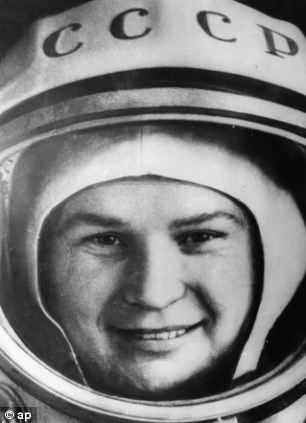.


Record-breaker: Valentina Tereshkova made history when she completed her mission at the age of 26 (left). She has said that she would like to travel to Mars
First woman to go into space offers to set out on one-way trip to Mars at the age of 76
- Valentina Tereshkova became a feminist icon after solo space flight in 1963
- Said Mars is her favourite planet and she is 'ready' to go there
- Was involved in group who researched the possibility of travel to the planet
- NASA aims to send a crew to orbit the red planet by the mid-2030s
A limitless imagination is key to pioneering new forms of space travel. But even by astronomical standards, it would be quite the flight of fancy.
The first woman to go to space has said she would fly to Mars, given the opportunity - even if it meant she never returned to earth.
76-year-old Valentina Tereshkova said Mars is her favourite planet and she harbours dreams of going there.
The Russian astronaut said: 'We know the human limits. And for us this remains a dream. Most likely the first flight will be one way. But I am ready'.
Ms Tereshkova, who became a national heroine at the age of 26 when she made a solo space flight, said she had been part of the group who studied the possibility of going to the Red Planet.The former textile worker completed her groundbreaking space mission in 1963 in the spaceship Vostok VI.
Ms Tereshkova was an amateur parachutist when she was recruited into a cosmonaut programme in Moscow.
She was trained with three other women as part of Kruschev's project for the first woman in space to be from the Soviet Union.
But she was the only woman to complete the mission. She was honored with the title Hero of the Soviet Union.
During her three-day mission, she circled the Earth 48 times and set a new record for time in space by completing the most orbits in the shortest recorded time.
Her flight was a major propaganda coup for the Soviet Union.
She was later given the United Nations Gold Medal of Peace in her role as a spokesperson for the Soviet Union.

On June 16, Russia will celebrate the 50th anniversary of Tereshkova's historic flight.
Astronauts traveling to and from Mars would be bombarded with as much cosmic radiation as they would get from a full-body CT scan about once a week for a year, researchers predict.
That dose is enough to raise their cancer risk by about three per cent, but experts caution that there are many uncertainties about the space environment's effects on the body.
The U.S. space agency, Nasa, aims to send a crew to orbit the red planet by the mid-2030s.
Private outfits like Inspiration Mars - backed by Nasa engineer-turned-space tourist Dennis Tito - are seeking volunteers for a Mars flight.
Quelle: Mail Online
